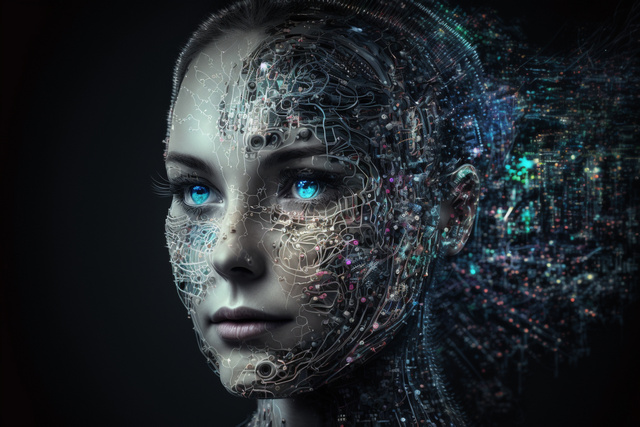
One of the top language models powered by AI created by OpenAI is ChatGPT. A Generative Pre-trained Transformer (GPT) model uses deep learning techniques to generate human-like text responses to various prompts. The model has been trained on a large corpus of text data from the internet and can answer questions, generate creative writing, and complete text prompts. ChatGPT can be used for various applications, such as chatbots, language translation, and text completion. With its advanced language understanding and generation capabilities, ChatGPT has become a popular tool for conversational AI development.
Plagiarism Free Content
The content generated by ChatGPT is not plagiarized in the traditional sense, as a machine generates it and does not copy the existing text verbatim. However, the model was trained on a vast amount of text data from the internet, which may include copyrighted or plagiarized content. As a result, it is possible for the generated text to contain similarities to existing text or generate content that accidentally violates copyright laws. It is the user's responsibility to ensure that any content generated by ChatGPT does not infringe on copyrights or other proprietary rights.
Copywriting Tasks
ChatGPT can be used for copywriting tasks such as generating product descriptions, marketing copy, and other written content. However, it is essential to note that while the model has been trained on a large amount of text data and can generate human-like responses, the text's quality may vary and may not always meet the standards expected for professional copywriting. Web design Toronto experts say,
"It may be necessary to review and edit the generated text to ensure its accuracy, clarity, and overall quality before using it for official or commercial purposes".
Generates Social Media Taglines & Captions
Yes, ChatGPT can generate social media taglines and captions. The model has been trained on a large corpus of text data, including various types of language, including social media. As a result, it can generate creative and attention-grabbing taglines and captions that can be used for social media posts. However, it is vital to remember that the quality of the generated text may vary and may not always meet the desired standards. Some editing and refinement may be required before using the generated taglines and captions for official or commercial purposes.
Write Content for Homepage, Product Pages & Service Pages
ChatGPT can generate content for homepages, product, and service pages. The model can generate human-like text based on a given prompt, making it a valuable tool for content generation. However, it is essential to note that while the generated text may be of good quality, it may not always meet the specific tone, style, or brand voice that a company or website is looking for. As with any AI-generated content, it is essential to review and edit the generated text to ensure its accuracy, clarity, and overall quality before using it on any official or commercial website.
OpenAI demos its latest developer release of GPT-4.
Total Words Written In One Time
The number of words that ChatGPT can generate at one time is not fixed and can vary depending on the specific implementation and configuration of the model. However, the model can generally generate text of varying lengths, ranging from a few words to several paragraphs. The length of the generated text is often determined by the specific prompt or context given to the model and other factors, such as the number of computational resources available for generating the text. Some implementations of ChatGPT allow for controlling the maximum length of the generated text to ensure that the generated text is of a desired length.
It Can't Beat Humanized Content
It is not accurate to say that ChatGPT can beat human content, as the quality of the generated text may vary and depends on many factors, such as the training data, the specific implementation, and the prompt given to the model. Even though ChatGPT can produce content that resembles what a human would write, it is not a substitute for human authors and may not always produce content of the same caliber.
In many cases, the generated text may require review and editing by a human to ensure its accuracy, clarity, and overall quality. Additionally, human writers bring unique experiences, perspectives, and creativity that AI models like ChatGPT cannot replicate. Ultimately, the quality of the text generated by ChatGPT depends on many factors, and it may not always be possible for it to beat human content in terms of quality or creativity.
Topic Ideas Generation
Yes, ChatGPT can generate topic ideas. The model has been trained on vast text data and can generate creative and unique ideas based on a given prompt. Providing the model with relevant keywords or a general theme can generate a list of potential topic ideas related to that theme. However, it is essential to note that the quality and relevance of the generated ideas may vary and may not always meet the desired standards. Some editing and refinement may be required to ensure that the generated ideas are of high quality and aligned with the user's specific needs and requirements.
Is It Paid or Free?
It depends on the specific implementation of ChatGPT and the platform it is being used on. Some implementations of ChatGPT may be open-source and free to use, while others may require a paid subscription or license. Additionally, commercial API services allow users to integrate ChatGPT into their applications, but these may also come with a cost. It is best to check the specific terms and conditions of the ChatGPT implementation being used to determine if there are any costs associated with its use.
Google Can't Detect ChatGPT's Content
Google and other search engines may have difficulty detecting content generated by ChatGPT, as it is often designed to be like human writing. However, search engines may penalize websites that use low-quality, spammy, or misleading content, regardless of whether a machine or a human-generated it.
It is vital to ensure that the content generated by ChatGPT is of high quality, relevant, and not misleading, as it could negatively impact the credibility and search engine ranking of the website. Additionally, it is essential to follow best practices for creating content, such as avoiding duplicate content, keyword stuffing, and other techniques that violate search engine guidelines.
Generally, it is recommended to review and edit the content generated by ChatGPT to ensure that it meets the desired quality standards and aligns with search engine best practices before using it on a website or other online platform.
About the Author
 Karan Sharma is a digital Commerce expert and the co-founder at Kinex Media, a digital agency in Toronto, Canada, focused on growing brands and businesses online thru effective websites, e-commerce, and digital marketing strategies. Karan can be found on Forbes. Connect with Karan on LinkedIn >
Karan Sharma is a digital Commerce expert and the co-founder at Kinex Media, a digital agency in Toronto, Canada, focused on growing brands and businesses online thru effective websites, e-commerce, and digital marketing strategies. Karan can be found on Forbes. Connect with Karan on LinkedIn >